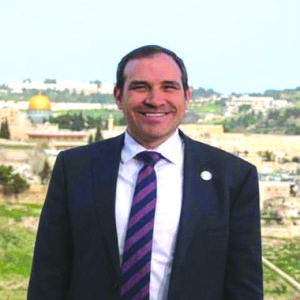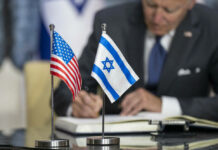
Aryeh Lightstone
In June 2019, I attended the Bahrain Peace to Prosperity Workshop, co-hosted by the King of Bahrain and Jared Kushner, senior adviser to then-President Donald Trump. In my professional life up to that point, I had always chosen to wear a kippah, the traditional Jewish head covering. The trip to Bahrain presented me with my first real dilemma as to whether to stick with that policy.
My experience on that trip and subsequent visits to the United Arab Emirates, Saudi Arabia and Morocco in pursuit of regional peace taught me a very important lesson regarding the prerequisite for true peace in the Middle East.
In the lead-up to my trip to Bahrain, I discussed my dilemma with many American counterparts. Nearly all of them advised me not to wear the head covering that would openly identify me as a Jew. After some thought, I decided that this view was inconsistent with the premise of the workshop to be held in Manama. In other words, if Bahrain was willing to host a workshop promoting peace, it stood to reason that there should be no issue with me wearing a kippah. On the other hand, if there was an issue with me, an American, wearing a kippah in Bahrain, how successful could the workshop possibly be?
Through a friend, I asked for an introduction to two influential Bahrainis to ask them directly. In the end, I didn’t need to ask the second Bahraini because the first was offended that I even felt the need to ask. He explained that I would be welcomed in Bahrain, and that as long as I was willing to respect others, that respect would be reciprocated.
I went to Bahrain, and not only did I wear my kippah throughout my stay, but the King of Bahrain, Hamad bin Isa Al Khalifa, also opened up the synagogue in Bahrain for the first time in many decades, enabling the Jewish Israelis and Americans attending the conference to participate in services there. The opening of the synagogue was not something that Bahrain tried to hide or keep discreet. In fact, it led the news, not only in Bahrain but in the West as well.
I learned two very valuable lessons from my first visits to Bahrain and the broader GCC region. The first is that American diplomats in general have missed, for the most part, the generational moves that several countries, including Bahrain, have made. This is problematic because to make good decisions and policy, it is critical to have a deep understanding of the current circumstances in these countries.
The second lesson is that a prerequisite for peace — that is, meaningful peace, not just the cessation of war — is sidelining extremism of all kinds. In the Middle East, this especially means the banishment of antisemitism.
In the days, weeks and months following Hamas’ Oct. 7 terrorist massacre, there has been a constant concern about the possibility that the Abraham Accords would fail. This is yet another misunderstanding of the momentum permeating the Abraham Accords countries. In 2023, the UAE inaugurated its Abrahamic Family House, a complex that houses a church, mosque and synagogue all constructed to the exact same height, square footage and magnificent caliber of build. This is not a country promoting mere tolerance — this is a country actively invested in coexistence.
While tolerance can mean that regardless of our differences, we’re stuck with each other so, therefore, we must tolerate each other, coexistence is the active promotion of the approach that you and I are better together precisely because we are not the same.
As I continued to wear my kippah in countries across the region during my efforts to help advance the Abraham Accords, an overwhelming number of people in Bahrain, the UAE, Morocco and Saudi Arabia approached me with enthusiasm, welcoming me to their homes, their culture and their countries.
Indeed, the new Middle East means it is easier to walk around with a kippah in Riyadh, Manama or Abu Dhabi than on the Penn, Columbia or Michigan college campuses. While this was a funny quip in the recent past, today it is deadly serious.
So what can we in the West learn from our friends in the GCC as to how to promote peaceful coexistence? The lessons are rather simple. Hatred and bigotry — the real kind, not the imagined versions — must be vilified. After it is clear that hatred, such as antisemitism, has no home, there can be enthusiastic support for coexistence.
The spirit of coexistence, tolerance and partnership at the heart of the Abraham Accords can help advance a brighter future for the Palestinians as well. In fact, this principle is far more important than “one state,” “two state” or any other buzzword the “experts” believe can bring peace to the Middle East.
For the Palestinians, their future will only change when they address this core issue. They, too, can take part in and benefit from the integration and win-win cooperation that is the future of the region. But to do so, they must rid themselves of the antisemitism, hatred and terror glorification that has become so deeply entrenched in the Palestinian education system, media, government and popular discourse. Until the Palestinians take such a step, they will be doomed to remain in an endless loop of violence and terror, with negative consequences for the entire region.
It is urgent that the lessons of the Abraham Accords and from our friends in the GCC regarding the critical necessity of promoting peaceful coexistence and rejecting hatred and terror be shared across the Middle East and the West.
This will allow us to combat spiraling antisemitism in Western universities and city streets and to advance a future of peace and prosperity in the Middle East.
Aryeh Lightstone is the former special envoy for economic normalization for the Abraham Accords and an author.






